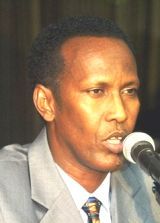More Somali ministers resign but Prime Minister says he will stay
Aug 2, 2006 (BAIDOA) — More Somalia’s interim government members resigned saying as their reason the prime minister’s reluctance to reach out to a rival Islamist movement. But the embattled prime minister refused to reign.
 More four ministers resigned today from the Somali Interim government. But the Somali government announced that the prime minister was working to replace the 36 ministers who have quit the 102-member cabinet in the past week calling for Gedi’s resignation, even after he escaped a vote of no confidence over the weekend.
More four ministers resigned today from the Somali Interim government. But the Somali government announced that the prime minister was working to replace the 36 ministers who have quit the 102-member cabinet in the past week calling for Gedi’s resignation, even after he escaped a vote of no confidence over the weekend.
“The prime minister is not going to resign. Instead he is consulting with the MPs who support him and clan elders to replace the ministers who have quit,” said government spokesperson Abdirahman Mohamed Nur Dinari from the government’s temporary base in Baidoa, about 250 kilometres (155 miles) northwest of Mogadishu. “There is no legal basis for the prime minister to resign,” he added.
Local media quoted the Islamists, who control the capital Mogadishu and a swathe of the south, as welcoming the move and calling for more ministers to resign.
“We have resigned because the prime minister has refused reconciliation to go on between the government and the Islamic courts and all the Somalis,” said Hirsi Adan Roble, an assistant minister who quit.
Dinari spoke as Somali President Abdullahi Yusuf Ahmed and parliament speaker Sharif Hassan Sheikh Aden held private consultations after they disagreed with PM Ali Mohamed Gedi on whether to engage the Islamic militia in peace talks.
He said the fallout was caused by Yusuf and Aden insisting on sending delegates to the Arab League-mediated talks with the Islamists in Khartoum against Gedi’s call for a postponement of the second round talks. A delegation of 15 was in Baidoa waiting for a plane that would take them to Sudan.
“The prime minister made it clear that the two were not respecting the principle of separation of powers and that it was his responsibility to chose delegates,” Dinari said.
The latest resignations came a day after 12 ministers and assistant ministers also walked out in a move that analysts and government sources said may ultimately clear the way for the newly powerful Islamists to take ministerial posts.
The Islamists, however, have not indicated whether they are interested in power-sharing, and some fear they are bent on taking all of Somalia and imposing hardline sharia law.
“This is great step forward and we call everybody in the government to step aside,” local media group Shabelle quoted Islamist leader Sheikh Hassan Dahir Aweys as saying.
“It is not the correct cabinet that fits Somali people, so they have taken the correct decision. Every government member is welcome to join the Islamists to participate in rebuilding peace in Somalia,” the hardline cleric said.
Eighteen ministers and other top officials also resigned last Thursday from their posts in Baidoa, the provincial seat of the government set up in 2004 in the 14th attempt to restore central rule to Somalia since 1991.
SOMALI CRISIS COULD BECOME A REGIONAL CONFLICT?
With Ethiopia sending troops across the border to help the government, according to witnesses, and Eritrea said to be arming the Islamists, diplomats are worried the Somali crisis could become a regional conflict.
The resignations leave Prime Minister Ali Mohamed Gedi looking increasingly vulnerable, although he did survive a no confidence vote in parliament at the weekend.
Gedi dismissed allegations he was not talking to cabinet ministers, and said the resignations had had little impact.
“It’s not affecting the possibility of the government to run the country,” he told BBC radio, speaking in English.
Gedi has come under increasing pressure from opponents who have criticised his “incompetent” performance.
One diplomatic source said the resignations should not be seen as the implosion of the government, but as a deliberate attempt to marginalise Gedi, viewed as an obstacle to talks with the Islamists. Gedi has called for peace talks to be postponed.
Many Somalis also blame Gedi for Ethiopian troops on Somali soil and accuse him of betraying his home — Mogadishu — and his Hawiye clan, to which many Islamists belong.
“This has nothing to do with the melting down of the TFIs (transitional federal institutions),” the source said.
He said the walkouts were a calculated move, supported by President Abdullahi Yusuf and the parliamentary speaker, to open up ministerial posts, with which to woo the Islamists and ensure the eventual return of the government to Mogadishu.
“Time is against the TFIs. The more the Islamic Courts Union develops Mogadishu, the more it will become a real capital and Baidoa will be emptied of its significance,” he added.
The resignations came as a senior U.N. official met the Islamists to discuss ways of securing aid supplies to Somalis.
(Agencies)
